| Sunday, May 23, 2004 |  |
|
|
|
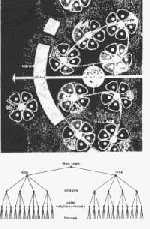 Clay Shirky mentions Chris Alexanders excellent essay A City is not a Tree from 1965. Alexander, the architect who invented the idea of Pattern Languages, is always brilliant, and no less so here. Clay says: Clay Shirky mentions Chris Alexanders excellent essay A City is not a Tree from 1965. Alexander, the architect who invented the idea of Pattern Languages, is always brilliant, and no less so here. Clay says: It’s a moment of disorientation I’ve had a couple of times — you find a great piece of writing, and think “Wow, this is really going to change things!”, only to discover that it is in fact decades old. The clash of historical vertigo with Internet Now is both wonderful and daunting.
I had that moment yesterday with Christopher Alexander’s A City Is Not A Tree from 1965. Alexander argues that the hallmark of designed cities (Mesa City, Brasilia) is that their builders invariably gravitate to tree-structures, where all sub-units of a similar type roll-up into a single super-unit, und so weiter, which creates an artificial and ultimately damaging simplification. He contrasts this with the structure of organic cites (London, NYC), which are organized as semi-lattices, where overlap and shared function is the order of the day. Semi-lattices? Back to that in a moment. Here are some excerpts from Chris Alexander's essay:Whenever we have a tree structure, it means that within this structure no piece of any unit is ever connected to other units, except through the medium of that unit as a whole.
The enormity of this restriction is difficult to grasp. It is a little as though the members of a family were not free to make friends outside the family, except when the family as a whole made a friendship.
In simplicity of structure the tree is comparable to the compulsive desire for neatness and order that insists the candlesticks on a mantelpiece be perfectly straight and perfectly symmetrical about the centre. The semilattice, by comparison, is the structure of a complex fabric; it is the structure of living things, of great paintings and symphonies.
It must be emphasized, lest the orderly mind shrink in horror from anything that is not clearly articulated and categorized in tree form, that the idea of overlap, ambiguity, multiplicity of aspect and the semilattice are not less orderly than the rigid tree, but more so. They represent a thicker, tougher, more subtle and more complex view of structure. He gives some good examples and indications that the human mind has a tendency, when faced with a complex organization, to re-organize it mentally into non-overlapping units. It is apparently difficult for us to comprehend anything that is overlapping, so we tend to drop most of the richness of complexity in order to be able to think simply.
 | The most startling proof that people tend to conceive even physical patterns as trees is found in some experiments of Sir Frederick Bartlett. He showed people a pattern for about a quarter of a second and then asked them to draw what they had seen. Many people, unable to grasp the full complexity of the pattern they had seen, simplified the patterns by cutting out the overlap. [T]he original is shown on the left, with two fairly typical redrawn versions to the right of it. In the redrawn versions the circles are separated from the rest; the overlap between triangles and circles disappears. |
Now, about semilattices versus trees. That gets a little technical, even though he explains it simply.
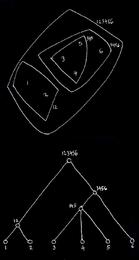 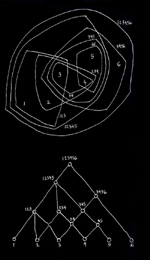 If you have some sets of elements (numbers are used here) that don't overlap, you can express their relationship in a tree diagram, as you see on the left. A set is a subset of another set, which is maybe a subset of a bigger one, etc. But nothing is a member of two sets. On the right it is different. One number or set of numbers might belong to several different bigger sets. Which can be represented in a diagram that looks like a tree, but which is more complex. That's the semilattice. If you have some sets of elements (numbers are used here) that don't overlap, you can express their relationship in a tree diagram, as you see on the left. A set is a subset of another set, which is maybe a subset of a bigger one, etc. But nothing is a member of two sets. On the right it is different. One number or set of numbers might belong to several different bigger sets. Which can be represented in a diagram that looks like a tree, but which is more complex. That's the semilattice.
I agree with Clay that the essays says something important about planned vs grown communities in general, and that this very much applies to information architecture rather than physical cities.
But my first thought is then why it only is a semilattice and not a lattice. I can guess that a lattice would be where anything can link to anything else. And in the world of information, like on the web, I'm afraid everything can contain everything else. A "country" can contain all sorts of things, but I might also make "country" be sub-ordinated a bunch of those things. So, where it obviously would be better to use semilattices than trees, we really need to be better able to deal with lattices that have no such restrictions.
Lilia talks about it. For me it mainly has to do something with classification. I believe that one of the reasons classifying information is difficult has something to do with the fact that in most cases tree structures are used for classification, so we have to find "unique folder" to put an idea or a document into it. And ideas never belong to "unique folders", they have multiple relations with other ideas, forming a web structure.[...]
It probably matter of personal preferences or thinking style, but I always have problems with tree structures. For example, I've got Typepad Plus account because it offers an easy way to put photos online only to discover that I can hardly use it because it forces me to organise my photographs into albums. And I always want to sort my photos by location, by date, by theme and by many other ways that I'll invent tomorrow.
Another example is about mind-mapping tools. Those that I tried force me to organise my ideas into tree structure. Of course, visualisation is nice to get an overview of ideas (especially if you use it for others), but forced tree structure makes these maps useless for (my) thinking. I tried to use mind-mapping software to structure my ideas for writing papers, but it didn't work. It's fine on paper for drawing a web of relations and thinking about steps of explaining them, but drawing a tree on my screen doesn't make any sense: I would rather start outlining directly in Word... I have trouble with tree structures too. I have tried a number of mindmapping tools and similar types of programs. Each time I end up being really frustrated because I don't really think like that. My world is not a tree. So my e-mail program and my web bookmarks and my filing system aren't really working for me, because they're all trees.
The day before yesterday Lionel and I were doing a little consulting job, helping a marketing directory visualize the network of people he was dealing with. It became really complicated to work out on paper which connections were key. And the mind mapping types of programs I had in mind suggesting would do no good, as they're tree oriented. A program could obviously help, but I don't know of any that fits the bill.
We have to figure out how to better deal with multi-dimensional cross-linked information. Sure, on a wiki, or on the web in general, we can freely link anything with anything else. But we quickly lose the sense of any organization. We make a big picture with thousands of lines, showing that, indeed, all sorts of things link to each other. But if we actually want to see useful information, we tend to over-simplify it into some kind of tree, rather than what it really is.
I will go as far as saying that it is essential for the further evolution of the human race that we learn how to better relate to multi-dimensional, multi-facetted, inter-connected information and relationships. There has got to be something between a colorful blob and a neat tree diagram. We have to be able to deal with complexity dynamically without having to reduce it no neither a big pile to search in nor a neat hierarchy. Google is great for searching the big pile. XML is great for all sorts of hierarchies. What is in-between? Society has the same problem. The news tells us it is a big confusing blob. Governments usually try to make everything into rigid tree-like hierarchies. In-between we'll have to invent a way of allowing everything to relate to everything else, overlapping as it needs to, without losing track of what is meaningful. Structures that support collective intelligence.
[ Knowledge | 2004-05-23 14:13 | | PermaLink ] More >
|
|
| Monday, May 17, 2004 |  |
|
|
|
 A post I saw yesterday on The MasterList's blog, which seems to not work right now in my browser, talks about Getting Things Done and Getting To Now. Since they made them into the acronyms of GTD and GTN, it almost sounds like a movement, like they suggest, or as memes at least. A post I saw yesterday on The MasterList's blog, which seems to not work right now in my browser, talks about Getting Things Done and Getting To Now. Since they made them into the acronyms of GTD and GTN, it almost sounds like a movement, like they suggest, or as memes at least.
"Getting Things Done" is a book by David Allen. It is about getting organized. Great book. Specifically it is about how to get things out of your head and onto a list that works for you. All the things you're trying to remember that happened or should happen or might happen. If you notice you're our of staples for your stapler and you decide you need to buy some, if then, the next time you walk by an office supply store, you don't remember that, your organizational system is failing. The idea in Getting Things Done (GTD) is to have it ALL down on appropriate lists, which will pop up for you in the right place and time. Might be on paper, might be a program. The result of doing that well would be that there's nothing that has to bounce around in your head that you must remember to do or not do. Which frees up your awareness for the present moment, rather than using it on remembering what you should do tomorrow or in five minutes or the next time you're next to a phone.
Voila, Getting To Now. So, getting all your To-Do items, and all your I'm-Trying-To-Pay-Attention-To items out of your head and into a workable system, is one way of doing it.
There are many others, of course. Meditation. Sharpening your senses. Jumping off of bridges with a rubber band tied to your ankles. Therapy or mental practices to overcome the Mind's zillion little traps and fallacies that try to keep you stuck in the past and the future. Despite that life is happening only Here and Now, and nowhere else, ever.
Getting To Now (GTN) might then be the umbrella label for all sorts of approaches that help you get here, and now.
You're surrounded by input and systems that conspire to make you be everywhere else but here and now. They often use stimuli in the here and now as a sort of mental/emotional judo to propel you everywhere else. Advertising uses sound and vision and triggered emotions to make you think that you've gotta have something else that you don't have.
Our economic system is a powerful force that knows nothing better than kicking you out of the present moment by pretending to give you an enhanced present moment. Buy NOW and don't pay before 2005!!! You end up paying off loads of things that are no longer here, and worrying about how to pay things in the future for years to come. It is one big time trap.
Getting To Now would be about freeing oneself from all the traps. All the traps that convince you to live in the past and in the future, despite that those are the only places where you'll never be.
So, organization helps. Organization to make space. To move those things out of your head that don't need to be there. Paying attention helps. Noticing what is here right now. Keen perceptions. Smell the roses that actually are here. And knowing the limitations of the human mind, will help. Knowing that you aren't going to arrive through thinking, because thinking is always about things that aren't here. You still need to do it sometimes. But most of the time you'd be better served by being present and dealing with what is front of you. Right now is the only time to enjoy anything. The only time to learn. The only time to fall in love. The only time to understand. The only time to act.
GTN.
[ Knowledge | 2004-05-17 08:31 | | PermaLink ] More >
|
|
| Saturday, May 15, 2004 |  |
|
|
|
 Ton talks about the Blog as a Personal Presence Portal, which I think is a very useful way of looking at it. Ton talks about the Blog as a Personal Presence Portal, which I think is a very useful way of looking at it. If no single medium can satisfy all our requirements to reach a high level of presence, that can cater for our need for discourse, than we need a mix of media to compensate for the shortcomings of any one medium in that mix. Elmine, in my view rightly, suggests that a blog is a very good starting point to present the available media mix to potential conversation and discourse partners. It serves as a fixed marker, that contains enough context to build trust and start a relationship through conversation. It also allows you to provide access to other media (e-mail, wiki, Skype, IM, video, documents etc., contact info for face to face) that can build on the conversations started at the weblog, but in themselves are more fluid which makes using them as a permanent marker less useful. Weblogs are much richer fixed markers as for instance profiles at fora, or YASN's, since they are fixed markers in location, but not fixed in content. Our weblog can serve as our Personal Presence Portal, the hub in our communicational flow.
What a lot of us try to do either with blogs or through a wiki, or whatever other medium we use on-line, is to open up space for conversation, dialogue, discussion, and discourse. We tend to bet everything on one horse though, expecting (and often evangelizing as well) that all our needs are served by one medium. Every medium has aspects that serve our purposes well. Blogs create context and thus help build trust, wiki's open up possibilities of collaboration, fora cater to discussions, e-mail to extended conversations, etc. etc. But as I argued in the previous paragraphs, a mix of media is needed to cater to the different factors in building a sense of presence.[...]
Dave Pollard, somewhat in frustration, asks why it often feels so awkward to start using different media with other people. And apparantly it is this awkwardness that keeps us from using the full mix of media at our disposal.
The awkwardness we feel stems from the difference in richness of media, I think. When I move on from a text based medium like blogs or e-mail to a voice oriented medium, the information richness increases. We get to know more about eachother, but requires that we show ourselves a bit more as well. This might not be a conscious thing, who explicitly is aware that our voice gives away more clues as to who we are then our written words. And when you switch media, you don't know if the other will be welcoming the attempt.[...]
Stepping 'down' from a face to face meeting to other media is no problem. But stepping 'up' without previous personal encounters is more difficult: we do not see our own awkwardness reflected in the other's body language. To get across it we have to make our awkwardness explicit, since we have no backchannel to deal with it in a more unconscious way. It seems natural to make a number of different media for interaction available for a central place, and a blog is probably the best choice. One can comment in my blog, of course. Or I might have a Wiki where we can work on some interlinked documents together. Or there might be a text chat channel. Or I give you my IM accounts. Or we might talk over voice or video. Or we might meet.
One of the problems is how to make the different media fit fairly seemlessly together. Blogs and Wikis are usually different programs, although some people have made attempts of combining them. IM is for sure through different programs. How's the right way of making them fit together? Usually we don't do much more than linking to the other media, and they remain rather separate. Like, I can give you my e-mail address or IM address in my blog, but my e-mail archives and IM archives remain separate, and I'd have trouble sharing them even if I wanted to.
But also, those media carry different assumptions with them, and the style of interaction is different in each. One shares oneself to a different degree. IM requires more of my attention, and is a bigger interruption than letting you leave a comment in my blog. E-mail requires less attention, but giving you my e-mail address opens up that you might send me a lot of stuff I don't really want. Opening myself up to voice or video calls requires more of my attention than any of those. Do I want that? A lot of the time my own answer would be no. If you use IM as a place to hang out and talk about the weather, I'm not very interested. If your way of using it somewhat matches mine, then no problem. If your idea of an IM interaction is: You: "Hi Flemming", Me: "Hi", You: "How are you doing?", Me: "Oh, fine", You: "What have you been doing?", then I'll probably feel I'm wasting my time, even if I'd enjoy our interaction under other circumstances. If we were meeting in person at a party, it would be perfectly normal. But on IM my expectation is that you get straight to the point.
I don't know if I'd call it akwardness, although that's part of it. I'm less comfortable with an audio call, unless we have a very specific outcome to accomplish. But to me it is more about whether I leave myself open for things that is not what works for me, and I can't easily back out of it. If you leave a comment in my blog and I don't have any urge to answer it, I don't have to. In IM I can also just not answer, but that is beginning to look a little rude. If we're talking over voice, I can't not be there. I'm forced to be present whether I want to or not. It would take me a while to back out of it, even if I'd rather be doing something else. OK, some people are more direct, but I would tend to be "nice" and diplomatic, and not often say I don't feel like talking. And if it were video, even worse, I couldn't just be checking my e-mail while talking to you.
It is useful to have a place, like my blog, that represents my online presence. But it would be nice if it also allowed me to limit my presence when desired. It could be very useful if it showed my whereabouts and schedule, so somebody could plan to meet me where I'm going to be next week. Assuming that I'd want to meet most of the people who'd want to meet me. Which is mostly the case. But if I knew 10 times as many people, maybe I'd be thinking differently about it, and I might need ways of avoiding meeting and talking with people that don't fit in with what I'm about right now. Might seem rude or unfriendly, but it is really about me being in charge of my own presence.
So, maybe that is about facing any possible awkwardness by stating up front what one is available for. Here's my e-mail address, but be aware that I don't answer all the mail I get, so don't count on an answer. Here's my IM, but these are the rules I play by. Here's my schedule, but be aware that I'm busy most of the time.
Anyway, on the subject of a blog page as a personal presence portal, here are some things it might be nice to have:
a calendar with my schedule, which other people can contribute to, if they want to fit into it
a connection to a GPS device I carry. Maybe just showing what city or neighborhood I'm in, but not exactly where.
a public mailbox, where people can leave comments or questions, not related to any particular post, which I can then answer publically
an indicator of my general status, like in an IM program. Busy, urgent queries only, not there, available, wanting to chat, etc.
something you can click to get my immediate attention, like maybe by sending to an IM program
more or less information depending on who the visitor is. Like, maybe only give my location and my IM if I already know them.
if I do know who the visitors are, maybe I'd want to make postings that only will appear for certain groups of visitors.
Somebody or the other has made all of those. But they could become more standard, of course.
A possible shift in what we perceive a blog to be, could be if we counted on most of the time recognizing the visitor automatically. Then the blog could be a personalized portal connecting us both ways, and would show what fits for my relationship with them. And maybe messages for them, or various kinds of information we share. Like I might have a shared wiki area with a handful of people, which shows for them, but not for others. And they would be able to configure their preferences for what they'd like to see from me.
And if the ways of doing so are standardized enough, then maybe their blog would talk directly with my blog, and either of our blogs would become a two-way information/connection aggregator, managing what goes in and out according to our preferences.
[ Knowledge | 2004-05-15 12:50 | | PermaLink ] More >
|
|
| Tuesday, May 11, 2004 |  |
|
|
|
Seb made a list of some of his favorite visionaries. I'm honored to be on the list too, of course. But I wanted to mention Lion Kimbro. Who's kind of a crazy guy, in the good way. See this interview. One of Lion's projects was a note keeping project, where, for some months, he kept track of all his thoughts on paper. Which apparently was a huge, but useful project. Albeit not one he'd recommend doing too often."The system described in "How to Make a Complete Map..." started about a year ago, and lasted 3-6 months. It's hard to say when it started, exactly, because it just kept evolving, and it evolved out of the previous systems. So, there's no real "starting point." For about 3 months, I was tracking thoughts pretty much all the time. The last month was the most concentrated period- it was more or less constant.
What inspired it was... Well, a lot of things. The book "Getting Things Done," by David Allen. "Wiki" was in the air, though I wasn't thinking of it consciously. The whole notion of "Intelligence," - in the CIA sense- not the IQ sense- was fresh in my mind. Remember, I was running medical records for a while- it makes you think differently about information, when someone's going to die if you can't find their chart. So it's a collection of things.
Anyways: I wanted to see if I could make myself smarter, by strategically placing notes to myself.
"Intelligence, as I define it, is: Getting the right information at the right time at the right place, towards whatever end you are going for.
So, to use the "Getting Things Done" analogy: You're at home, and you realize you need to get a Philip's screwdriver. If, the next day, you're walking down the street, and you walk by a hardware store- if you don't think to get the screwdriver, that's an "Intelligence Failure." You're not getting the right information, at the right time, at the right place.
There's deeper concepts to that map- "Intelligence Process," and "Intelligence Database," and things like that. You can get into the nitty-gritty of it.
But, basically, I wanted to see if I could make myself smarter, by strategically placing notes to myself. Adopting an Intelligence Process, and carrying around an Intelligence Database." Interests me because I also really like "Getting Things Done", and I'm always looking for how to be better organized, and I might possibly also be crazy enough to come up with some kind of pervasive system like that. Anyway, Lion has a lot of energetic and smart things to say about notes and wikis.
[ Knowledge | 2004-05-11 16:35 | | PermaLink ] More >
|
|
| Sunday, May 9, 2004 |  |
|
|
|
 In a comment on FutureHi, Michael Anissimov mentioned a number of pervasive errors in reasoning that are common to practically all human beings. Well, I know about that kind of thinking fallacies, but I didn't know all the "official" terms. In psychological research, a number of these fallacies have been given names, and been studied in some depth. In a comment on FutureHi, Michael Anissimov mentioned a number of pervasive errors in reasoning that are common to practically all human beings. Well, I know about that kind of thinking fallacies, but I didn't know all the "official" terms. In psychological research, a number of these fallacies have been given names, and been studied in some depth.
Availability Bias
Situations in which people assess the frequency of a class or the probability of an event by the ease with which instances or occurrences can be brought to mind.
People inadvertently assume that readily-available instances, examples or images represent unbiased estimates of statistical probabilities.
E.g. if you've mainly been around a certain type of people, you easily get to believe they represent a typical cross-section of the population. At least, your estimates of various characteristics and beliefs will be biased towards the profile of the people you know. "To a hammer, everything is a nail".
Conjunction Fallacy
When two events can occur separately or together, the conjunction, where they overlap, cannot be more likely than the likelihood of either of the two individual events. However, people forget this and ascribe a higher likelihood to combination events, erroneously associating quantity of events with quantity of probability.
Here's an example:
Bill is 34 years old. He is intelligent, but unimaginative, compulsive and generally lifeless. In school, he was strong in mathematics but weak in social studies and humanities.
Which statement is more probable:
A. Bill is an accountant that plays jazz for a hobby, or
B. Bill plays jazz for a hobby?
92% of people in a survey answered A. Which is completely wrong. See answer
Wason selection task
Research has shown that people find it very difficult to decide what information is necessary in order to test the truth of an abstract logical reasoning problem. The Wason Selection Task is often used to examine this issue.
A typical experiment using the Wason Selection Task will present some rule, and ask subjects to see if the rule is being violated. Consider the rule: If a card has a D on one side, it has a 3 on the other side. Subjects are aware that on the particular set of cards, each one has a letter on one side and a number on the other side. Four cards are shown, such as those below:

Very few people can correctly pick the two cards to turn over to verify the rule. The correct cards are D and 7; most likely, you picked D and 3. Seeing what is on the reverse of the 7 card can lead to falsifying the rule if a D shows up. Seeing what is on the reverse of the 3 card cannot falsify the rule. It can confirm the rule, but not falsify it.
Support Theory
Various theories based on Amos Tversky's research, also related to availability bias, representativeness bias and anchoring.
Support Theory has an empirical base of results showing that different descriptions of the same event often produce different subjective probability estimates. It explains these results in terms of subjective evaluations of supporting evidence. [...]
According to the ‘framing effect’ peoples’ understanding of a problem is profoundly influenced by how the problem is presented.
For example, support for an option seems to increases the more that the option is broken down into smaller components. And naturally, if an option is particularly highlighted (anchored), people would tend to choose that over others, whether it is logical or probable or not.
Another interesting tidbit:
"This framework questioned the assumption of "homo oeconomicus", that is, of human beings motivated by self interest and capable of rational decision making behavior."
Masses of people are so easy to mislead (advertising, politics, media) that there's certainly no guarantee that they'll make rational decisions, which assumption is the basis for our economic system.
Representativeness Heuristic
People tend to judge the probability of an event by finding a ‘comparable known’ event and assuming that the probabilities will be similar.
As a part of creating meaning from what we experience, we need to classify things. If something does not fit exactly into a known category, we will approximate with the nearest class available.
Overall, the primary fallacy is in assuming that similarity in one aspect leads to similarity in other aspects.
The gambler’s fallacy, the belief in runs of good and bad luck can be explained by the representativeness heuristic.
People will also ‘force’ statistical arrangements to represent their beliefs about them, for example a set of random numbers will be carefully mixed up so no similar numbers are near one another.
Examples:
If I meet someone with a laid back attitude and long hair, I might assume they are Californian, whereas someone who is very polite but rigid may be assumed to be English.
People will often assume that a random sequence in a lottery is more likely than a arithmetic sequence of numbers.
If I meet three people from a company and they are all aggressive, I will assume that the company has an aggressive culture and that most other people from that firm will also be aggressive.
There are a lot more theories and terms and models, of course. See, for example, this list of psychological theories, explained in simple terms.
Obviously, the human mind isn't overly suited for making logical decisions, or for correctly estimating the probability of events. It might seem a bit surprising that we even manage to keep ourselves alive and accomplish complicated technological feats. It explains at least why we often make decisions that don't serve us, and why we easily elect the wrong people to lead us. Of course it helps greatly if we can stay conscious of the various ways we are likely to fool ourselves, so we can avoid them, as much as possible, when we're trying to make important decisions.
[ Knowledge | 2004-05-09 10:22 | | PermaLink ] More >
|
|
| Sunday, April 25, 2004 |  |
|
|
|
 When I was a kid, a relatively significant portion of my attention was dedicated to Donald Duck magazines. The new issue of Anders And (Donald Duck in Danish) came out every Tuesday. I don't think there's any issue between 1960 and 1970 I hadn't read a number of times over. And, well, the best ones were the old ones. Original Carl Barks stories, particularly. I haven't noticed any equivalent magazine in the U.S., although they obviously existed in earlier times, so it seems to have been a bigger deal in Europe. "Anders And & Co" still comes out every week in Denmark. Disney licensed out the characters, so most of the content has been created in Europe for many years. When I was a kid, a relatively significant portion of my attention was dedicated to Donald Duck magazines. The new issue of Anders And (Donald Duck in Danish) came out every Tuesday. I don't think there's any issue between 1960 and 1970 I hadn't read a number of times over. And, well, the best ones were the old ones. Original Carl Barks stories, particularly. I haven't noticed any equivalent magazine in the U.S., although they obviously existed in earlier times, so it seems to have been a bigger deal in Europe. "Anders And & Co" still comes out every week in Denmark. Disney licensed out the characters, so most of the content has been created in Europe for many years.
As everybody knows, Donald Duck has three nephews: Huey, Dewey and Louie. They are members of the Junior Woodchucks, which is a kind of boyscout group. And, now, to get to the point, they have a most useful accessory: "The Junior Woodchucks' Guide Book". I only just looked up what it is called in English. I know it as "Grønspættebogen", which means almost the same thing in Danish. Anyway, the cool thing is that this book seems to have the answer to anything. Not just boyscout stuff about tying knots and starting fires. No, just about anything anybody wants to know. Just look it up in the guide book. Translations of ancient languages, advanced chemistry lessons. How everything works. The history of everything. I'm not sure if it promised to contain everything, but it always seemed to provide some useful knowledge whenever Huey, Dewey and Louie looked anything up in it. Which they would cheerfully read aloud, and it would most of the time get them out of trouble.
According to one of the story lines, the guide book was written by Guardians of The Lost Library of Alexandria.
Naturally I would like one of those books. I would really like the knowledge of the world to be presented in such a handy format.
The closest thing to it in the real world is an encyclopedia. Maybe Wikipedia is what comes closest on the net.
But it is also a certain philosophy, of presenting knowledge in a simple and immediately useful how-to format. We find that for example in survival manuals. On my bookshelf is the U.S. Army's Survival Handbook. It explains how you would survive in wilderness. If you find yourself stranded far from civilization, but you happen to have the book with you, it will explain how to build a good shelter from branches and leaves, and it will tell you what kinds of plants you're likely to be able to eat, and what you should do if you get bitten by a snake.
So much of our knowledge is inaccessible. It is embedded in vastly specialized fields with complicated terminology, which it takes years to master. Our organization of knowledge is so distributed and specialized that it wouldn't take much of an interruption of our civilization to lose most of it. How are metals extracted from the earth? How do I make electricity? I have vague ideas about much of it, but if I had to start from scratch, I wouldn't get very far.
There isn't any terribly good reason we shouldn't have most of what we know handy in an encyclopedic overview format.
Personally, the way I learn best is to get the big overview first. Some people learn differently, but as far as I'm concerned, I'm confused if I can't get the big overview executive summary up front. Give me the key points, and then I have a framework to fill the details into.
I can't count the number of times I've had to read some big, long text in order to realize that it adds up to something quite simple that could have been said in a few sentences. I'd like to have those sentences up front please.
There are plenty of books and websites that do that, of course. I guess I'd just like to be better able to find them first.
Or I'll just have to join the Junior Woodchucks.
[ Knowledge | 2004-04-25 07:19 | | PermaLink ] More >
|
|
| Tuesday, April 20, 2004 |  |
|
|
|
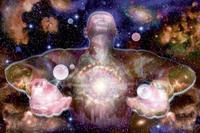 Paul Hughes makes a compelling case for free will as an unavoidable constant, tying into and going beyond neuroscience, quantum mechanics, and many other subjects. Article "Super Free Will: Metaprogramming & Quantum Uncertainty" at FutureHi. Paul Hughes makes a compelling case for free will as an unavoidable constant, tying into and going beyond neuroscience, quantum mechanics, and many other subjects. Article "Super Free Will: Metaprogramming & Quantum Uncertainty" at FutureHi.
Neuroscientists and behavioral scientists and cognitive researchers can show how most of our behaviors and thoughts can be shaped or controlled by chemistry and by the inputs we are provided. By finding the right place to put electrodes on someone's brain, or by setting up an environment that influences them in a particular way, one can shape people's reality, and the throughts and feelings they have, to a remarkable extent.
The funny thing is that eastern mystics and yogis and meditators might say similar things, from another angle. Most of what you do is just robotic, arbitrary behavior patterns that you do completely automatically, based on what has been imprinted and conditioned into you. You walk around, half-asleep, in an arbitrary world that is projected for you, having thoughts and feelings that mostly aren't your own.Ok, so where does free-will come in? So far it seems like I’ve decimated every last shred of free-will and human dignity. Yes, and for good reason! Unless we understand the full extent of just how brainwashed and programmed we are, we will never have anything close to a free-will. To be free it first helps to intimately understand just how imprisoned we are by our own nervous system. Freedom comes from knowledge, not ignorance. To know thyself is the pathway to liberation and freedom, as I will now explain. No matter what we do, we're mostly dealing with a world that comes in through our perceptions and our nervous systems, and before we even get around to having a thought about something, we're already many levels of abstraction removed from the real event. And when we form ideas and concepts and try to share them with each other, they're all subject to the same limitations. Even scientists are thoroughly conditioned into logical fallacies developing from layers upon layers of fuzzy abstractions and semantic and neurological limitations.
The answer is that the only thing that leads out of the trap is consciousness that includes knowledge of all these limitations and that strives to transcend them.
Quantum mechanics entails that any measurement includes uncertainty. Even if you check it with another measurement, it just involves more uncertainty. Ad infinitum. The only thing that breaks the chain is when a conscious observer decides what it means.
Likewise, no matter how mired we are in uncertainty and subsconscious conditioning from our environment, we can always move a step up. We can encompass all the uncertainty, including our own imperfect perceptions and memories, and aim at getting what the meta-program is. We can increase our freedom and free will and awareness by understanding better how things work, and by transcending the previous limits we experienced. If we don't add in our own consciousness, we'd keep going in circles. But by becoming conscious of a new understanding, which provides more choices and more freedom, we can actually move up in the spiral. And we can repeat that any number of times. Finding how our previous beliefs and behavior patterns limited us, and moving on to a meta-understanding of them, which gives us more flexibility. But which, of course, again becomes a limitation sooner or later, which we need to transcend. All of this includes, of course, not just how we think, but how capable we are at working with our environment.So here we are altering our own molecular DNA, and soon the entire physical world down to the atomic level. Another way of looking at this, is DNA having evolved out of the slime, is now becoming recursive enough to begin altering itself with internationality and purpose towards something stronger, smarter and more versatile. Going further, the atomic world is now becoming aware of itself, and as it becomes aware of these limits, just like we becoming aware of our own programming, will begin to re-program this matter to become more expressive to this internationality, to the logos, the memeplex that is our noosphere. Will this self-recursion ever end? Probably not. Do we have free will? As I have shown, free-will is a matter of degree. It is easily demonstrated that we can increase the levels and degrees of freedom as we become aware of our own limits. I would say, not only is there free-will, but eventually everything in the universe, including the very essence of ourselves will become re-defined by it. In the end, everything will change, but one thing will remain and increase, the level of our free will, our consciousness, the fundamental that is and comprises everything. As Paul says, free will not only exists, but ultimately it is all that remains in an ever changing uncertain universe. And I agree. For that matter, it seems abundantly logical to me that the universe and our existence in it makes no sense without the perpetual existence of consciousness. I.e. being aware of something and being able to make a choice about it. That can happen at very low levels, automatically and imperfectly, or it we can strive towards doing it better, gaining more all-encompassing wholistic knowledge, understanding ourselves and the universe better, and doing more interesting things with that new awareness.
[ Knowledge | 2004-04-20 05:49 | | PermaLink ] More >
|
|
| Monday, April 19, 2004 |  |
|
|
|
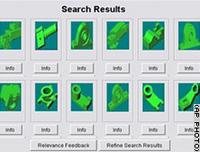 CNN mentions researchers working on making a search engine that can search for pictures that are similar to something you're looking for. More impressively, they can do that with 3D objects too. CNN mentions researchers working on making a search engine that can search for pictures that are similar to something you're looking for. More impressively, they can do that with 3D objects too.Draw a big potato, and the system responds with a bunch of, well, potato-looking objects -- and a few urns. Those seem wrong until you rotate your potato, orienting it vertically instead of horizontally, and see your sketch actually does resemble an urn, narrow on top and bottom and bulging in the middle. That's cool and useful. And, to expand the idea a bit, we need many more ways of getting beyond words. There are many useful things we might want to search for that are more based on a pattern than on a set of key words. We can search very well for keywords now, and even get good and useful results quickly. My wife asked me to find out which country was the first to introduce equal voting rights for women. It took me about 10 seconds and the answer was in the first match in google. (The answer is New Zealand, in 1893, shortly followed by Holland). But I don't have good ways of searching for information that is either more fuzzy, or that is a pattern or constellation of other complex pieces of information. Like, a group of people suited for a certain type of project. Or a past project that successfully functioned in some manner I'm interested in, but in a different field than I have in mind. Or some data that would match a certain scenario I have in mind. Situations where the diagram might look similar, but the content is different, and the different content and the complexity means that a keyword search wouldn't help much. Neither would a picture search, as there might not be any graphicsl representations and there's no guarantee they will look similar, even if they have similar structure.
[ Knowledge | 2004-04-19 12:52 | | PermaLink ] More >
|
|
| Friday, April 9, 2004 |  |
|
|
|
 Lilia Efimova on "From creative mess to products (blogs and wikis for thinking)" Lilia Efimova on "From creative mess to products (blogs and wikis for thinking)"
"Thinking of blogs vs. wikis to support thinking. For me blogging is easier - it shows how ideas unfold over time and somehow I don't have a problem when I create new page (I do think twice in wikis - because it increases navigation mess). Blogging is also about permalinking and hypertexting half-baked ideas...
The problem is that at the certain moment there is a critical mass (critical mess ;) of bits related to a theme. At this moment you need a least an overview of all of them and then a way to construct something more coherent. Wikis are great for that. It's much easier to get an overview of ideas (if they collected on one page :), edit them into something better or even go for refactoring the whole thing.
But then you get the clarity of a final product and lose an overview of path that took you there. And I'm getting more and more convinced that process and artefacts on the way is as important as the final product." I myself haven't so far really gotten into Wikis. Even though I'm missing a place to put subjects together in a more coherent way. Blogs work really well for me to write in, exactly because I don't have to think of where something fits or where I'm going with it or even if it is a complete thought. It is a somewhat divergent tool. Happily goes in many directions. But also keeps a linear record, and is a unified pool to find things in later. But then I'd also like convergent tools. Tools that help me make things come together into more clear and complete ideas, more full projects, functional spaces for collaboration, etc. I'm not sure Wikis automatically facilitate that, although they can of course. They can be whatever one makes them. Including something that goes off into a zillion directions and where one can't easily find the pieces again. Or focused spaces where one or more people keep refining what they know.
Then about "process and artefacts on the way". More channels, in part. And ways of stepping through what happened, along various dimensions, most significantly chronologically. A blog shows things that happen (are posted) chronologically, and it includes credits of where posts come from, or what they respond to. Which other tools like Technorati can come and catalog. But it probably doesn't show us the whole process of how the posts come about. Wikis keep track of successive changes, i.e. revisions of pages, but I'm not sure anybody uses that to chart the process of increased value accummulation.
Need tools that can better implement guiding patterns. A blog is one pattern, of a continous stream. A wiki is a free-form format where you can come up with your own pattern, but it is hard to guide it. Other tools might provide gentle guidance that inspires certain things to happen, and that include sufficient tracking of how it happens, to be able to examine the process after the fact or along the way.
[ Knowledge | 2004-04-09 09:53 | | PermaLink ] More >
|
|
| Thursday, April 8, 2004 |  |
|
|
|
 An interpretation of the Tao Te Ching, via Bird on the Moon: An interpretation of the Tao Te Ching, via Bird on the Moon:"If you can talk about it, it ain't Tao.
If it has a name, it's just another thing.
Tao doesn't have a name.
Names are for ordinary things.
Stop wanting stuff. It keeps you from seeing what's real.
When you want stuff, all you see are things.
These two statements have the same meaning.
Figure them out, and you've got it made." And, no, it is not me translating it, even though it says "stuff" several times. Some people think I say "stuff" and "things" way too much. And stuff.
[ Knowledge | 2004-04-08 09:05 | | PermaLink ] More >
|
|
| Sunday, April 4, 2004 |  |
|
|
|
 Via Voice of Humanity, a very inspiring article from Nova Spivack: The Metaweb: The Global Mind Just Got Smarter: Via Voice of Humanity, a very inspiring article from Nova Spivack: The Metaweb: The Global Mind Just Got Smarter:One of the many cool things about the Metaweb is that it functions as a vast bottom-up collaborative filtering system. RSS feeds represent perspectives of publishers. Because feed publishers can automatically or manually include content from other feeds they can "republish," annotate and filter content. Every feed is effectively a switch, routing content to and from other feeds. You are my filter. I am your filter.
Entire communities can collaboratively filter information, in a totally bottom-up way. The community as a whole acts to filter and route content in an emergent fashion, without any central coordination. On top of this sites can then provide value-added aggregation and information-refinery services by tracking memes across any number of feeds and then repackaging and redistributing them in virtual feeds for particular topics or interests. And these new feeds are fed right back into the collective mind, becoming raw materials for still other feeds that pick them up.
What we have here is the actual collective consciousness of humanity thinking collective thoughts in real-time, and we get to watch and participate! We are the "neurons" in the collective minds of our organizations, communities, marketplaces. Our postings comprise the memes, the thoughts, in these collective thought processes. Already the Metaweb is thinking thoughts that no individual can comprehend -- they are too big, too distributed, too complex. As the interactions of millions of people, groups and memes evolve we will see increasing layers of intelligence taking place in the Metaweb. Is the web really turning into the global brain waking up and becoming smarter than any of us? Why not? It is probably the best candidate to do so.
[ Knowledge | 2004-04-04 10:49 | | PermaLink ] More >
|
|
| Tuesday, March 23, 2004 |  |
|
|
|
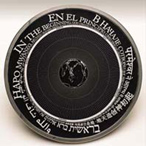 One of the projects of the Long Now Foundation is The Rosetta Project: One of the projects of the Long Now Foundation is The Rosetta Project:The Rosetta Project is a global collaboration of language specialists and native speakers working to develop a contemporary counterpart of the historic Rosetta Stone. In this updated iteration, our goal is a meaningful survey and near permanent archive of 1,000 languages. Our intention is to create a unique platform for comparative linguistic research and education as well as a functional linguistic tool that might help in the recovery or revitalization of lost languages in unknown futures.
We are creating this broad language archive through an open contribution, open review process and we invite you to participate. The resulting archive will be publicly available in three different media: a micro-etched nickel disk with 2,000 year life expectancy; a single-volume monumental reference book; and through this growing online archive. See, it is a bit of a problem to plan how you can leave a legacy of knowledge for future generations that actually lasts long enough for them to be able to access it, and that will be meaningful to them. A CD-ROM has a shelf-life of maybe 10 years. Most binary encoding formats would be pretty useless in a couple of hundred years, as they're just a bunch of zeros and ones, and unless somebody remembers what the encoding scheme was, it is no easy task to play them back. Their answer is to actually engrave regular letters into disks that will last a long time, and to include the text in multiple languages, just like the actual Rosetta Stone, which allows the decryption of Egyptian hieroglyphs, because a text was given simultaneously in hieroglyphs, Demotic writing, and Greek.
[ Knowledge | 2004-03-23 16:20 | | PermaLink ] More >
|
|
| Wednesday, March 17, 2004 |  |
|
|
|
Slashdot has a thing on functional programming languages. Which I didn't really know much about. But functional programming might best be compared with how a spreadsheet works, or how the SQL database query language is working. I.e. you specify the structure of the result you want, rather than having to figure out step-by-step how it would come about.
I'm a programmer, and despite useful advances such as Object Oriented Programming, my job would mostly consist of coming up with steps for solving problems. There are big complex problems I'd kind of love to solve, but which I can't, because I haven't figured out the steps that would solve them. So, it is refreshing with different ways of thinking about stuff like that. Where you rather work on specifying the results you'd like to get, and a compiler or interpreter will optimize the best way of getting there. Bugs don't have quite the same meaning when you work that way. You might not get the answer you're looking for in the first shot, but it is not a matter of the whole thing crashing, which is how normal programming is. You adjust your formulas untill you get the type of results you hoped for, rather than spending most of the effort getting your steps to work at all.
Now, how about that for solving big complex problems involving many people. I'm mainly thinking about information sharing in social networks. I hold certain kinds of information and certain skills and I have certain interests. I could use certain things from other people, either generally, or in specific situations, or to solve problems that suddenly come up. Maybe I need an accountant who knows about tax issues and company formation differences between the U.S., France and England. Maybe I need the side window for a 1959 Cadillac Seville. Some things already fit into solutions that people have made. Like eBay would fit for the latter. But what if nobody has spent the resources for piecing together a specific solution. Or if I don't know where it is.
So, the thought is that I might possibly express my needs in a functional way. Well, we're talking about those things that might be put into some kind of reasonably precise expression. I'm looking for this thing, and I'll be willing to pay that much, and I want it by this time, and from somebody within this radius from my house. And that some super parallel distributed interpreter comes along and grabs my query, together with everybody else's, and optimizes them all, so as to use the least possible resources in order to get everybody approximately what they want, if it is available.
Oh, there are lots of problems in that, of course. It is merely an idea. It is not clear how one would express complex requests into an unambiguous query. And I'm not sure anybody would know how to write such an interpreter. But it reframes the problem. One task is to be able to express clearly the types of things people want, and which we expect that computers might facilitate. And the other task is to write the engine that processes all those queries and gives the best possible results. And each of those separate areas would of course be improved as people find better and better ways of doing it.
[ Knowledge | 2004-03-17 04:02 | | PermaLink ] More >
|
|
| Tuesday, March 16, 2004 |  |
|
|
|
These are just some lose thoughts while I'm thinking aloud.
One can learn a good deal just by plotting various kinds of qualities on different axes in a coordinate system and noticing what seems to end up in the different quadrants.
Now, one of the things I'm interested in is how to get myself and others the most useful information I need in the easiest and fastest way possible. That sounds kind of tame in itself, so let me skip ahead a little bit.
What I really would want is that I'm presented with exactly the most useful information I need at any given time, without any work on my part. Doesn't have to relate to computers particularly - I'd like that in life.
If I suddenly need a plumber, it would be nice if the first person who walked by my house, say within the next minute or so, would happen to be a plumber who could use some work. And, incidentally, he happened to be the most skilled and reliable guy, and cheap too.
OK, it wouldn't be much more trouble if I had to make a phone call and he showed up. But the trouble is the information. I need to know who the best person is, who has optimum pricing, who can be here quick. Maybe I already know the answer and it would be great. Maybe I know who to call quickly, and they would know the answer. All of that would work. But the yellow pages involves too much chance.
And that's a simple and routine problem. It is harder if I want to find somebody to go into business with, or I needed the answer to a unique and maybe complex question.
I might know the answer already. I might be good at guessing it. Or I might know people who're likely to know, and I can reach them quickly. Or I have the right book to look up in. Or I go and search in a search engine. Google has made me much smarter already. I can answer a lot of questions within a minute, simply by guessing at a couple of search words. But, again, if my need or my question is more complex and unique, it will not give me anything.
Nevertheless, I want ALL of it to be ordered suitably, just for me. All information in the world that I might possibly need. I don't necessarily care HOW it happens. Although, I do care if I need to help making it happen in some way. But at first I just care about the effect I want.
There's, for example, how ordered my information is...

OK, words can be used in various ways, and of course everything is ordered somehow. But I'm talking about what I might need. If I go into a library, the best kind of order would be that the two books I need happened to be standing right by the entrance, easy for me to see. A friendly sign saying "Flemming! Here are the books you're search for!" would help too. See, if doesn't at that point matter to me that the whole library uses the Dewey decimal system and alphabetical sorting. What matters is that I find what I want quickly. Or slowly if somehow I enjoyed that more. Anyway, we're talking about a somewhat subjective quality of orderedness. But we're talking about how to accommodate our subjective idea of what order something should be in, by some system in the real world, which probably is computerized. And it needs to do it even if I don't really know exactly what my preferred order is. I want it to be in the right order without me having to spend any significant time in finding out what that might be. Of course, if I do know, and I suddenly have a preferred order I can state, like "Give me all the books sorted by the colors of their backs", I'd want that too.
Actually, besides how ordered things are, we get into the issue of how much work it is to make it so. I could sort all of the books in the library in color order, if I took a few weeks and they didn't kick me out. Or some other mechanism might do it for me. Anyway, there's naturally a scale of...

which leaves out various dimensions, like who or what does the work, and does it need to be done in advance, or is it done at the time the need arises.
I suppose it is not a problem if something requires a lot of work, if either it has been convenient for somebody else to already do it before I need it, or some parallel supercomputer has put it together, and can present the results to me easily. But I prefer doing as little as possible. And I suppose we can say that it is generally better if things happen with ease and minimial trouble, as opposed to with great time and effort. And how that adds up is maybe more clear if I put it together in two dimensions like this:
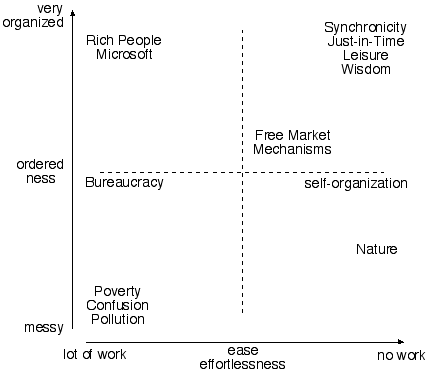
OK, I'm really just brainstorming here. Nothing scientific about it, and we can argue about how to use the words and where various things will fit.
But you'll notice for example that some activities and some people involve a lot of effort for little result. It is sometimes how it is to be poor or having bad infrastructure. Walking 10 miles for a pot of water. Or how poor people in an otherwise rich society might do stupid things and waste the resources they have. Or how people just trying to survive in developing countries might make an ecological mess.
Then there's the situation that you apply massive power and resources for a rather small purpose, and it therefore can be extremely well organized and ordered. Say you're a billionaire and you insist on getting fried hummingbirds freshly caught in Madagascar on your dinner plate every evening. You might command a jet to fly them to you every morning, and employ a whole hierarchy of people to make it happen in the most precise manner possibly. Or, say you're Microsoft, and you make software. Instead of making better and more inherently elegant software, you might instead hire 1000 more highly qualified engineers to try to close the holes in what you have. In other words, if you have great wealth or power, you can afford doing something in an inefficient but very organized way. If you are very wealthy and you want some kind of information, you can have a whole team of the most highly qualified and highly paid experts sitting around trying to get it for you.
In the lower right, I put "Nature", which one could well argue about. Nature is ordered, but not in the way we normally call ordered or organized. It is in many ways a mess, but a mess where nothing is ultimately wasted, and where there are lots of synergies between different lifeforms and elements. Lots of work is being done, but not really in the sense of what we normally call work. Each living creature is pretty much just going about its business and doing what comes natural, and apparently not losing any sleep over how things are "supposed to be done". If some suitable food walks by, you'll eat it, and if something comes by that considers you food, they'll eat you. The waste products are just left behind randomly. But somehow it all works rather beautifully, and something else will probably consider those waste products its own lunch. If you examine, for example, ants, they just walk around and follow very simple rules for what to do. There's a lot of redundancy, and eventually things get done, haphazardly, but quite well. It is done in a messy way, but without anybody having to make plans or work hard on making them turn out. Thus, great ease, but low organization.
Although we humans can learn a lot from the rest of nature, and strategies like what ants are using to find food might well be useful for our own algorithms to automate, those approaches aren't how we ourselves would like to work. We'd like to work at a higher order. I'm not satisfied with having to wander around haphazardly if I already know what I want and where I'm going. I wouldn't at all be nonchalant about being eaten on the way there. No, we humans usually want something fairly complex, but focused, and we want to be quite sure to get it, but most of us don't have a lot of time and resources to put into it.
So I want something very ordered that takes next to no work to acquire. We're back to talking about information. Ideally I want something just-in-time, exactly when I need it, without having to wring my brain trying to plan everything in advance, and without having to start a big project whenever I want something.
When we're talking about information, there are various noble approaches that are aiming at giving me ordered and useful information easily. There's the Semantic Web, which tries to mark everything with added attributes so that we can ask more meaningful questions. Instead of just storing text, somebody notes down which parts are an "address", a "person", a "place" and that kind of thing. Which adds some intelligence. And the hope is that people will actually feel like recording this kind of information somehow. Another philosophy is that this isn't going to happen, but we need better search engine technology that itself guesses at what things mean, based on our behavior when we move around on the web, so that it might better give us what we might need. Maybe it will be combinations. Social networks, or networks of economic activity, might gather information, by both the behavior and the deliberate value choices of many individuals. And it might add up to better information, and a better way of giving me the information I might want.
As a user, I don't necessarily care how it happens. I want an experience where things appear either like synchronicity, where an apparently random item I get presented with happens to be exactly what I need; or simply as the answer to a question I pose. But I expect that this can happen in some kind of sustainable way, just like how google comfortably can provide everybody's searches without incurring any impossible costs.
I suppose some kind of free market, self-organizing, collaborative filtering is part of what will get there. Plus somebody's clever inventions that aren't there yet.
[ Knowledge | 2004-03-16 16:15 | | PermaLink ] More >
|
|
| Monday, March 15, 2004 |  |
|
|
|
Nova Spivack via Dina and Jon:
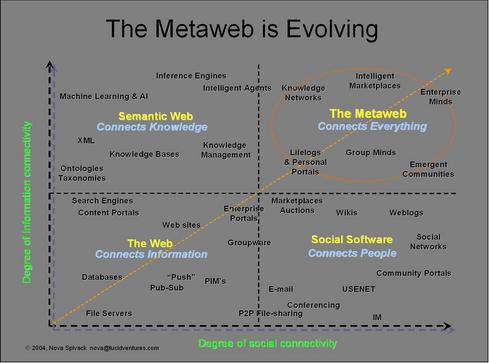
Good. Always helps with some diagrams. So, we want the MetaWeb, of course. Everything connected. Now we just need somebody to implement it.
[ Knowledge | 2004-03-15 09:03 | | PermaLink ] More >
|
|
| Thursday, February 26, 2004 |  |
|
|
|
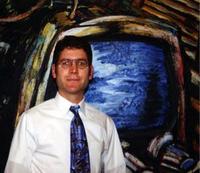 Stuart Henshall summarizes a paper, Sense in Communications", by Douglas Galbi, who is an economist with the FCC. The paper is an in-depth 190 page study on "Presence". He states in part that: "To avoid disaster, the telecommunications industry needs to shift from providing telephony to providing means for making sense of presence." Anyway, I agree with Stuart that it is important stuff. Stuart Henshall summarizes a paper, Sense in Communications", by Douglas Galbi, who is an economist with the FCC. The paper is an in-depth 190 page study on "Presence". He states in part that: "To avoid disaster, the telecommunications industry needs to shift from providing telephony to providing means for making sense of presence." Anyway, I agree with Stuart that it is important stuff.Key Insights:
"Presence" is fundamental to creating future communications value. We are a a critical point where the interaction of photography (pictures) and telephony (calls) will radically reduce the cost of making sense of presence and create new opportunities for value creation
What makes a letter a joy, or a voice from an object (a telephone headset) a comfort, rather than a horror, depends on the sense of another's presence, despite that person's physical absence. The way this sense is activated, and at what cost, directly relates to sensuous choices in communication.
Three models of communications illustrate why:
1)information transfer (under different sensory circumstances eg face to face to new forms of social software),
2)storytelling (shared interpretation and different sensory economics), and
3)sense of presence (an element of real-time presence detection and participation). Of these only "Presence" provides the sensory opportunity to radically redirect strategies for mobility and social networking.
Since most demand for information is for textual information, information transfer offers relatively little scope for comparative advantage in sensuousness. In storytelling, high-production cost, streaming audio-visual stories dominate other feasible sensuous forms. At the other end of the technological spectrum, the extraordinary advantages of paper and ink as a storytelling medium - low-cost, highly portable, widely accessible, and durable - make it difficult for a sensory alternatives to create a competitive advantage.
Providing means for persons to make sense of presence in the absence of physical proximity is a business in which sensory innovation has enduring opportunities to create value. Making sense of presence in social interaction among friends and family has long driven demand for telephony and photography.
Making sense of presence also drives demand for use of e-mail, instant messaging, mobile short messaging services (SMS), and camera phones. Making sense of presence is a good not constrained by conventional distinctions between content and communication.
Communication services have enormous opportunities for innovation, differentiation, and commercial competition in organizing sensory modes to support production of this highly valued good. Not understanding this good could be disastrous for major, well-established organizations. What I really want is to be present. Present with my own life, but also present with people I care about, no matter where they physically are in the world. Present with activities and fields of information I care about. And I want to be present with as many senses as possible. At the same time, and that is just as important, I want to be as non-present as possible with certain things I don't care about, like spam, and activities I choose not to be part of at the moment. Communication technology is merely one possible way of accomplishing some of that.
[ Knowledge | 2004-02-26 15:39 | | PermaLink ] More >
|
|
| Friday, February 13, 2004 |  |
|
|
|
 Denham Grey: Documentation & knowledge. A oft repeated question / assertion in KM is the link between explicit documentation and knowledge. The point I'm trying to make, is documentation alone does not = knowledge. To retain knowledge against attrition you have to have a community that can appreciate the context, understand the issues, talk the language, adopt the assumptions, share the tricks, interpret and adapt the explicit stuff to changing external circumstances."
Matt Mower: "I have formed the view that it is intrinsic to knowledge that it be actionable. By this I do not mean that it necessarily provokes action, but that it enables it. From this viewpoint the question is documentation knowledge? doesn't matter very much. Any particular document may, or may not, be knowledge; to different people, and at different times. Everything depends upon the context." How about if no document can possibly be knowledge. Knowledge is meaning and shared understanding. Some representation of data might contain more or less information, depending on how much signal is there, and if there's a way of reading it. And the information only becomes knowledge to the degree that I draw meaning from it. If it is in a language I don't understand, there would be close to zero knowledge for me. But does it have to be actioable? I don't necessarily think so. It has to enable the action on my part of acquiring, possessing and changing meaning. I might find some new meaning, or I might be reminded of what I already know. But, depending on the context, I might or might not be happy with the mere knowledge, without having anything particular to go and do with it. It might just become part of me, and thus become wisdom. Which might mean that I might be more able and capable to act or not in the future, without any longer having to keep track of what information or knowledge enabled me to do so.
[ Knowledge | 2004-02-13 20:39 | | PermaLink ] More >
|
|
| Friday, December 12, 2003 |  |
|
|
|
Howard Rheingold at SmartMobs:"I have come to believe that new understandings of cooperation and collective action are emerging in a dozen different fields, with implications far beyond the "technologies of cooperation" that enable smart mobs. I am embarking on a project with The Institute for the Future to map and catalyze a broad interdisciplinary study of cooperation and collective action. This PDF (a preprint from IFTF's latest Ten Year Forecast) highlights some of the issues near and dear to smartmobbers, but also looks beyond the horizons of the work I did in Smart Mobs to sketch out the broader landscape we are beginning to explore. This is an ambitious project and we are looking for foundation or angel funding or corporate funding. If you are an angel or a foundation or a corporation who understands what we are getting at, contact me for a more detailed proposal.
Commons foster innovation. Consider the Internet: at its core, it’s a public good. Anyone who follows the technical protocols can use it. But it’s also a source of commercial innovation and wealth. Tim Berners-Lee did not have to ask permission or pay a fee to launch the World Wide Web. The founders of Amazon and Yahoo! became billionaires through their use of the Internet commons to create new kinds of private property.
The literature of science is also a commons. Once the law of gravity or the antibiotic property of penicillin mold was discovered, people were free to open ski resorts or start pharmaceutical companies. But Newton’s equation and Fleming’s discovery entered the public domain—to benefit humankind and enable others to build on their discoveries for both private and public interest. control the emerging innovation commons.
Large content distributors have stretched copyright laws into territory that formerly was held in the public domain. Broadband carriers are seeking permission to control the content of the data that moves through their parts of the Internet. Incumbent license holders in the TV and radio frequencies are encouraging the Federal Communications Commission to maintain 1920s-style regulation over the new wireless spectrum (although treating it as a commons instead of private property could potentially enable millions more broadcasters than today—with much more innovative programming and services)." Yep, very important battle. Increasingly, and more and more openly, a very small percentage of the population are very actively trying to keep the rest of us from sharing, cooperating, collaborating and taking collective action. By pretending they own most of the ways we might think of doing so.
[ Knowledge | 2003-12-12 06:41 | | PermaLink ] More >
|
|
| Sunday, November 30, 2003 |  |
|
|
|
 Relating to the preceeding posting, there's an article today in the NY Times about Color Cognition, referencing various studies of differences in color perception between people speaking different languages, using different distinctions. Relating to the preceeding posting, there's an article today in the NY Times about Color Cognition, referencing various studies of differences in color perception between people speaking different languages, using different distinctions.Literary Welsh has no words that correspond with green, blue, gray or brown in English, but it uses others that English speakers don't (including one that covers part of green, part of gray and the whole of our blue). Hungarian has two words for what we call red; Navajo, a single word for blue and green but two words for black. Ancient Greek's emphases on variables like luminosity (as opposed to just hue) led some scholars to wonder seriously whether the culture at large was colorblind. The conclusions seem to be that, sure, we can all see all the colors (if we aren't physically color-blind), whether we have words for them or not. But we make better distinctions if we have words for them, and we therefore have trained ourselves in noticing those distinctions. Nothing particularly surprising in that. But apparently it is part of an ongoing argument between Universalists that say that we all essentially see the same world around us, and Relativists that say that we all see different worlds, shaped by what we've learned.
[ Knowledge | 2003-11-30 15:54 | 0 comments | PermaLink ]
|
|
| Saturday, November 29, 2003 |  |
|
|
|
"Ontology" is a word that used to belong in philosophy as any kind of systematic description of existence. I can't say I entirely get it, but it would be like a flow chart or verbal description of a world view. Like a religious or scientific way of describing the mechanics of the universe in some detail. See more here. Then it became a key concept in artificial intelligence. There it would also be a specification of a world view, but usually more limited. It would define, say, for a robot what "exists". The walls are there, and your tools there. Or it would try to structure a picture of the world so that a natural language program might be able to say something half-intelligent about it. "The hipbone is connected to the tailbone." And now ontologies are also a key piece in knowledge sharing and trying to create a semantic web. If knowledge needs to be shared effectively amongst a diverse group of people, it becomes very important to also have a good representation of what world view or context the knowledge relates to or exists in. See more here. An ontology might sometimes be represented as a taxonomy, which is another hard word, relating to a hierarchy of labels, such as the way animals are classified, or the Dewey decimal system. An ontology doesn't have to be limited like that, though. Which makes it all the harder to wrap one's mind around. Anyway, what I was trying to get to was what Denham Grey was saying about what an ontology is:A (shared) expression of belief, an agreement on the terminology (and sometimes the meaning) for communication and action. Ontologies serve to bound discourse, facilitate communication within & across communities and networks, leverage action by gathering agreement around meaning, values, objects, the way things are and what is 'out there' that is important. Ontologies help to orientate new folks and act as the stores for key learnings & distinctions accumulated through experience. Ontologies have a large influence on identity and help with the tacit transfer of context. I'm still a bit confused. But it is an important subject in a world with an accelerating volume of information that we're at the same time trying to make more meaningful. In electronic media we can only with difficulty share meaning unless we have good ways or representing large complex sets of relationships and rules and concepts fairly finitely, and we know we're speaking the same language. If we could just transfer a "thoughtball" that gives the whole picture and sets the whole stage, we might have a better chance of communicating meaningfully. "Here you go, here's my world! Study up on it and we can talk meaningfully in the morning."
[ Knowledge | 2003-11-29 19:02 | | PermaLink ] More >
|
|
<< Newer stories Page: 1 2 3 4 5 6 7 Older stories >> |

